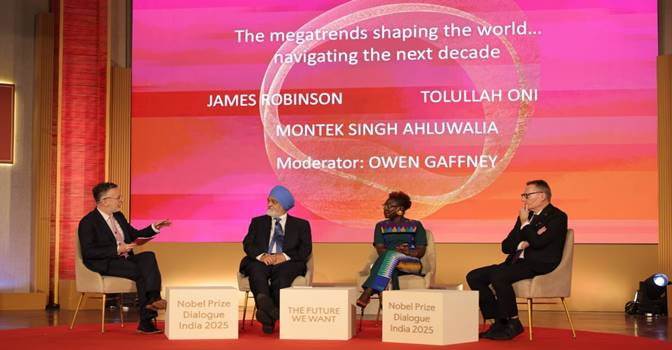
In his opening remarks, Siddharth Sharma, CEO, Tata Trusts, highlighted, “India’s greatest wealth lies not just in its natural resources, but in the power of its people and their capacity to learn. From that dream grew part of the Tata Trusts’ legacy of nurturing centres of excellence. Our collaboration with Nobel Prize Outreach was forged through a shared belief – that knowledge must be harnessed to serve humanity. We are well on our way to being the third largest economy in the world. The future envisages justice – social, economic, and political. To achieve this, we must empower the youth and create ecosystems fuelling innovation for the people who need it most. Today, we are honoured to reaffirm this commitment and host the dialogue.”
Nobel Prize laureate David Macmillan (chemistry 2021) spoke of organocatalysis and the power of great ideas. He left the audience with an inspiring thought “We’re one catalytic reaction away from solving climate change. We have to do a better job of explaining to the world how important these types of scientific areas are — because we really are that close.” Reflecting on his time in India, Macmillan added, “This is my first time in India, it’s been mind-blowing. There’s a real sort of bubbling confidence and aspiration that you can feel coming to India. It feels like this is India’s moment — and India knows it.”
Laureate James Robinson (economic sciences, 2024) reflected on this pivotal moment for prosperity and progress, noting that societies grow by exchanging ideas in many directions across cultures. He said, "If you look at existing cultures, they don't have this aspect of the one-way street. It's a two-way street, or a multi-way street. Everyone is borrowing and learning from each other and mingling, mixing and recreating."
In her talk, urban epidemiologist Tolullah Oni explored ‘hope’. She emphasized the wisdom of young people to reimagine the future. And called for democratizing the process of knowledge-creation and giving space to the youth to voice their views on the future they want.
Montek Singh Ahluwalia, former Deputy Chairman of India’s Planning Commission, in a panel featuring Robinson and Oni, commented on the complexity of solving the world’s multi-faceted development challenges.
Microbiologist Gagandeep Kang spoke of global health threats and breakthroughs, sharing insights from India's pioneering work in development of vaccines. The closing panel, featuring Macmillan, Kang, and biotech entrepreneur Kush Parmar, discussed how science and technology can drive well-being for both humanity and the planet. The sessions were moderated by Owen Gaffney, Chief Impact Officer at Nobel Prize Outreach, and Jayaram Chengalur, Director of the Tata Institute of Fundamental Research.
Reflecting on the spirit of collaboration, Hanna Stjärne, Executive Director, Nobel Foundation, added, “It has been truly inspiring to listen to and interact with students and experts throughout the day. By reflecting on common challenges, exchanging new ideas across boundaries and learning from one another, we create a dialogue that makes a difference.”
Mirroring the spirit of the dialogue, was an art installation: Parag Art Wall. A collaborative artwork created by 200 young children from Bengaluru, the village of Koppal in Karnataka, and a slum in Mumbai. This display captured vibrant artworks of the future children imagine for themselves and their country.
The event also celebrated India’s rich artistic heritage with a captivating performance by renowned violinist Dr. L. Subramaniam, representing the intersection of music and science, and celebrated vocalist Kavita Krishnamurti.
The Nobel Prize Dialogue India 2025 continues in Mumbai on November 5, bringing together a select audience of corporate leaders and policymakers to explore the role of philanthropy, and institution-building to shape a future grounded in science and empathy.
To access more information about the event and the media kit, please visit: https://www.tatatrusts.org/nobel-prize-dialogue-2025-india